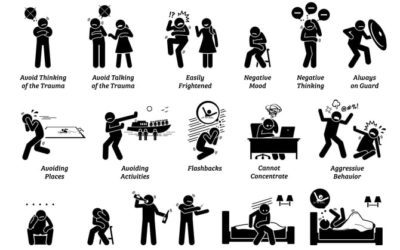Trauma Therapy
Do You Feel Like A Shell Of A Person?
Have you ever felt broken, unworthy of love, or riddled with self-doubt and shame?
 Are you curious why you often shift between feeling detached and numb one moment and flooded with intense emotions the next?
Are you curious why you often shift between feeling detached and numb one moment and flooded with intense emotions the next?
Would you like to better understand what’s happening and, with self-awareness, learn ways to improve your emotional well-being and foster a stronger sense of self?
Perhaps most mornings, you wake up exhausted and gripped with dread. Constantly on the alert for danger, you may feel like no place is ever safe or comfortable. If you struggle with staying grounded in the present moment, you might lack focus and become easily overwhelmed by simple tasks. Even when life is calm, you might feel restless or actively avoid people or situations that trigger you.
Your Relationships May Be Troubled
You may struggle to establish trust with others or, conversely, tend to be too overly trusting and get hurt. Perhaps your fear of rejection prevents you from setting clear boundaries. A harsh inner critic may convince you that when problems arise, it’s always your fault.
Growing up in an environment where your stress response was frequently triggered could be the underlying cause of why you wrestle with anxiety, experience flashbacks, or struggle to maintain healthy relationships. Although your brain’s survival system has done its best to protect you, it limits your well-being in the long term. Fortunately, therapy can help you better understand the physical, emotional, and mental effects of trauma and offer effective treatments to repair what has been broken.
Trauma Experienced In Childhood Affects Two-Thirds Of Adults
When we think about trauma, we often imagine a single overwhelming incident, such as a car accident, active combat, or sexual assault. However, the complex trauma that stems from prolonged experiences within intimate or family relationships can be every bit as harmful. Whether someone lives through “Big T” or “Little T” trauma, either type of experience can lead to emotional dysregulation and other PTSD symptoms.
 The Adverse Childhood Experiences (ACEs) Study shows that “about 64 percent of adults in the United States reported they had experienced at least one type of ACE before age 18. Nearly one in six (17.3 percent) adults reported they had experienced four or more types of ACEs.” [ https://www.cdc.gov/aces/about/index.html].
The Adverse Childhood Experiences (ACEs) Study shows that “about 64 percent of adults in the United States reported they had experienced at least one type of ACE before age 18. Nearly one in six (17.3 percent) adults reported they had experienced four or more types of ACEs.” [ https://www.cdc.gov/aces/about/index.html].
Complex Childhood Trauma Can Shape Core Beliefs About Ourselves
Growing up with emotional neglect, abuse, the loss of a parent, inconsistent caregiving, abandonment, and domestic violence not only shape our nervous system responses and system of attachment but can also foster anxiety, shame, and disconnection. When our formative years lack security, it impacts our core sense of self and ability to form healthy relationships with others throughout life.
Because we may rationalize that our childhood was “just the way it was,” we may not recognize how profoundly we’ve been affected, especially if we compare ourselves to others and minimize our experience. Or maybe we can’t fully remember our early experiences due to emotional numbing and dissociation.
Therapy is a safe space to explore how trauma lives in your body, emotions, and relationships, and How you currently function can be rooted in survival reactions to toxic childhood environments and events. The patterns that worked well back then may no longer serve you now. Utilizing gentle approaches that won’t re-traumatize you, we will work at a comfortable pace that guides you toward gaining insights and finding relief.
Trauma Therapy Can Help You Become The Person You’re Meant To Be
Living with the effects of trauma can make it feel like you are your trauma—as if the past is woven into your very identity. But trauma is not who you are. It is an experience held in your nervous system, a survival response that became stuck when you didn’t have the resources to process it at the time. Healing isn’t about revisiting the past; it’s about gently supporting your nervous system to complete what was left unfinished, so you can reconnect with your natural sense of aliveness and wholeness.
We begin by grounding in the present and building internal resources that foster a sense of safety and stability. From this foundation, we work with your body’s natural rhythms, slowly and mindfully exploring sensations, images, emotions, and meaning. As we do, we help thaw survival energy to safe completion, releasing held tension and restoring balance to your system.
Because “trauma freezes time,” past experiences can feel like they are still happening in the present. But as your system unravels old patterns, you’ll begin to feel the difference between then and now—freeing yourself from the grip of past events. Through this process, you’ll come to understand that trauma is something that happened to you, not who you are. And as you reconnect with your body’s innate wisdom, you’ll rediscover a sense of ease, empowerment, and connection—the authentic you that has been there all along.
What To Expect In Sessions
Therapy will be a collaborative process with goals emerging organically as we work to understand your symptoms and their impact. Whether you seek relief from anxiety, emotional numbness, relationship struggles, or a deep sense of disconnection, we tailor each session to meet your needs. Together, we identify triggers, recognize survival strategies, and develop skills to regulate emotions, build resilience, and restore a sense of safety. Each session is a step toward lasting change.
Over time, you’ll gain a greater capacity to respond rather than react, trust yourself, and feel more present in your life. Healing is not just about resolving the past; it’s about reclaiming a sense of wholeness and vitality.
Trauma Treatment Will Engage Body And Mind
Drawing on methods from Somatic Experiencing, Dynamic Attachment Repatterning experience (DARe), Inner Relationship Focusing (IRF), Trauma Informed Stabilization Process (TIST), Gestalt, and mindfulness, therapy will focus on approaches that notice bodily sensations and integrate parts of the brain that have stopped talking to each other as a result of trauma. Working slowly and carefully, you will process trauma in small pieces to prevent overwhelm.
 Some strategies we may include are:
Some strategies we may include are:
- Identifying resources and anchoring secure attachment by remembering positive relationships, memories, or images that create a felt sense of safety;
- Switching attention back and forth between trauma-related sensations and a sense of safety to help discharge trapped energy;
- Developing the capacity to set healthy boundaries and create secure relationships with others; and
- Learning how to manage your emotions so you feel more in control;
With skilled guidance, healing from trauma can be truly transformative. Reducing your PTSD symptoms allows you to reclaim a sense of agency as you access untapped resources within yourself. As you let go of old survival patterns and false, shame-based beliefs, you discover your authentic self, which is more powerful, resilient, and alive.
But Maybe You’re Not Sure If Trauma Therapy Is Right For You
I had a bad experience with previous trauma and PTSD counseling—how will therapy with you be different?
Having a bad experience with a therapist can be very painful and make it hard to trust again. For that reason, my approach is nonjudgmental, compassionate, and focused on you. Trauma therapy should feel safe, not like something that’s being done to you.
If you’re open to trying again, we’ll create a space where you feel heard, respected, and in control of your healing. You deserve support that deeply honors who you are.
If I engage in trauma therapy, will I end up reliving painful memories?
Understandably, you may be concerned that you’ll get so overwhelmed with distressing feelings and memories in trauma counseling that you won’t be able to function. Trauma treatment helps your nervous system process and integrate slowly what’s still affecting you without forcing you to relive painful memories.
We build safety first, helping you regulate emotions, reduce triggers, and restore a sense of control. Healing happens at your pace, allowing you to move forward with more ease, resilience, and connection.
How is your approach to trauma treatment different from traditional talk therapy?
Although talk therapy focuses on cognitive thoughts and insights, trauma lives in the body. That’s why my approach goes beyond words to help you gently and slowly process trauma where it’s stored: in your nervous system. We work at a pace that feels safe, using body awareness, attachment repair, and parts work to build resilience, emotional regulation, and groundedness. Therapy isn’t about reliving trauma—it’s about restoring a sense of safety, connection, choice, and vitality in the present moment.
It’s Possible to Heal Emotional Wounds
Having the awareness that you could use some support is the first step. To schedule a free consultation to find out more about trauma therapy with me, please contact me.
Blog Posts
Living with Your Partner’s PTSD
Trauma is a complex and confusing thing to live with. It can be even more so if your loved...
Are You Suffering from Trauma? Look for These Signs of PTSD
If you’ve had a traumatic experience lately, your mind and body need time to recover. If you've...
Recognizing PTSD in Women: Signs and Symptoms
“Research indicates that women are twice as likely to develop PTSD, experience a longer duration...



